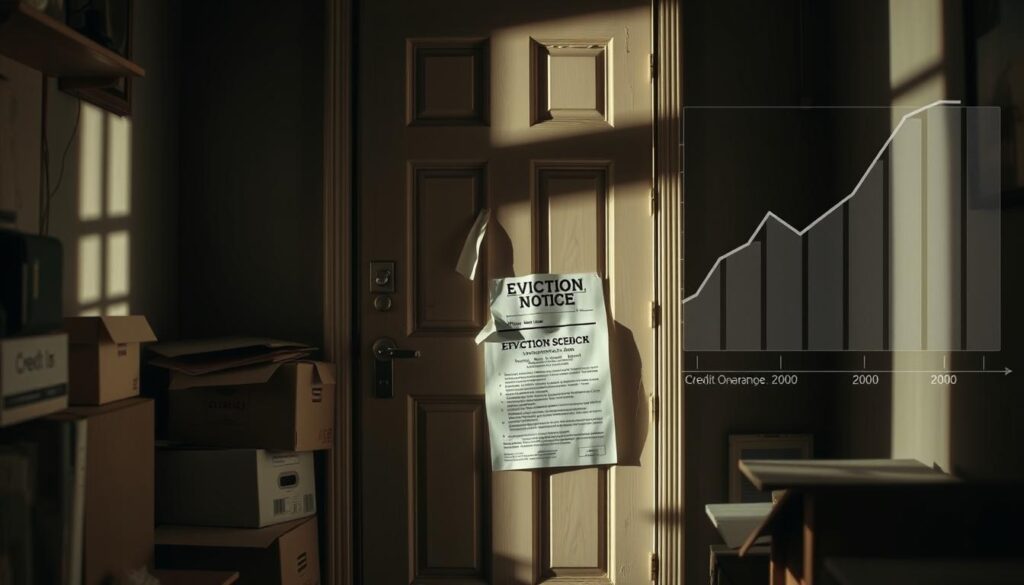Eviction can seriously harm your credit score. This piece explores how eviction affects your credit and its consequences. We’ll also cover ways to lessen the damage and rebuild your credit.
Key Takeaways
- Eviction records can be reported to credit bureaus and negatively impact your credit score.
- Outstanding rental debt from an eviction can also harm your credit history.
- The effects of an eviction on your credit can last for years, making it harder to secure future housing or loans.
- Negotiating with landlords and disputing inaccuracies on your credit report can help mitigate the damage.
- Rebuilding your credit through positive payment history and professional credit counseling is crucial after an eviction.
Understanding the Impact of Eviction on Credit
Evictions can severely affect your credit score and financial health. It’s vital to know how evictions are reported to credit bureaus. This knowledge helps in dealing with the aftermath of such a tough situation.
What is an Eviction?
An eviction is when a landlord legally removes a tenant from a rental property. It’s usually due to unpaid rent or breaking lease rules. The court system handles this process.
Evictions can have long-lasting effects on a tenant’s financial history. They can also make it hard to find housing in the future.
How Evictions are Reported to Credit Bureaus
Evictions are negative public records often reported to major credit bureaus. These include Experian, Equifax, and TransUnion. This information can stay on your credit report for up to seven years.
An eviction can harm your eviction credit score recovery. It may make it tough to get housing, loans, or other financial products.
The impact on eviction credit damage can be huge. It can lower your credit score and make getting credit or jobs harder. That’s why it’s crucial to understand evictions and take steps to lessen their effects.

“An eviction can have a lasting impact on an individual’s credit, making it crucial to address the issue proactively and seek professional eviction credit counseling to navigate the process effectively.”
Does an Eviction Hurt Your Credit Score
An eviction can greatly affect your credit score. The impact varies based on timing, reporting method, and your credit history. It can make getting loans, credit cards, or housing harder.
An eviction on your credit report is a negative item. It lowers your credit score. The damage depends on your specific situation.
- If the eviction is reported as a court-ordered eviction, it can have a more severe impact on your credit score than a voluntary move-out.
- The timing of the eviction is also crucial. Recent evictions tend to have a greater effect on your credit score than those from several years ago.
- The way the eviction is reported by your previous landlord can also influence the impact on your credit. Inaccurate or incomplete reporting can lead to further complications.
An eviction can stay on your credit report for seven years. This long-lasting mark can affect your future housing, credit, and job prospects.
Facing eviction? Take action to protect your credit score. Try talking with your landlord. Dispute any errors on your credit report.
Work on rebuilding your credit over time. These steps can help lessen the damage to your financial future.
Factors Affecting Credit Score After Eviction
Evictions can seriously harm your credit score. Two main factors play a role: outstanding rental debt and public eviction records. Understanding these can help you reduce the damage.
Outstanding Rental Debt
Unpaid rent or fees can hurt your eviction credit damage. Collection agencies may report this debt, affecting your credit score. Tackling this debt head-on is crucial.
Seek eviction credit counseling or try negotiating with your former landlord. This can help your eviction credit repair efforts and speed up eviction credit score recovery.
Public Eviction Records
Public eviction records can directly impact your credit score. Credit bureaus may include this information in your credit history. This can make finding future housing opportunities difficult.
Challenge any errors in the eviction record. Try to get the record sealed. These steps are key in mitigating the damage to your credit.
| Factor | Impact on Credit Score | Mitigation Strategies |
|---|---|---|
| Outstanding Rental Debt | Negative impact due to collections reporting | Negotiate with landlord, pay off debt, seek credit counseling |
| Public Eviction Records | Directly damages credit history and score | Dispute inaccuracies, seek to seal eviction record |

Take action to address these factors. This can help lessen the long-term impact of an eviction. Your efforts can lead to successful eviction credit score recovery.
Short-Term vs. Long-Term Effects of Eviction
An eviction on your credit score can have varying impacts. Short-term effects can be severe, making housing and loans harder to get. However, long-term effects can be managed by taking steps to rebuild your credit.
Right after an eviction, credit bureaus typically receive a report. This leads to a sharp drop in your credit score. Finding new housing or getting loans becomes more challenging.
The eviction and credit rating impact doesn’t have to last forever. With effort and good financial habits, you can improve your credit over time. Address any rental debt and dispute inaccuracies on your credit report.
Establish a positive payment history to minimize long-term effects. This can help restore your financial well-being after an eviction.
| Short-Term Effects | Long-Term Effects |
|---|---|
| Significant drop in credit score | Gradual improvement in credit score |
| Difficulty securing new housing, loans, or credit | Improved ability to obtain housing, loans, and credit |
| Negative impact on financial opportunities | Opportunity to rebuild credit and financial stability |
Understanding the eviction impact on credit helps create a recovery plan. This knowledge allows individuals to minimize damage and work towards financial stability.

“An eviction can be a significant setback, but it doesn’t have to define your financial future. With the right approach, you can overcome the short-term challenges and rebuild your credit over time.”
Mitigating the Damage to Your Credit
An eviction can hurt your credit score. Take action to lessen the blow. Two key strategies can help: negotiating with landlords and disputing credit report errors.
Negotiating with Landlords
Reach out to your former landlord to negotiate a settlement. This may involve paying off rental debt or removing the eviction record. Many landlords are open to working with tenants who want to resolve issues.
They might agree to a payment plan or compromise. This can help reduce the impact on your credit score.
Disputing Inaccuracies on Credit Reports
Check your credit report for any eviction credit damage that’s wrong or incomplete. Look for errors in rental amounts or dates. You can dispute these mistakes with credit bureaus.
This process aids in eviction credit repair and boosts your eviction credit score recovery. It’s a crucial step in improving your financial standing.
Address the eviction credit damage head-on. Seek eviction credit counseling for expert advice. These actions can help reduce the long-term effects of an eviction.

Rebuilding Your Credit After an Eviction
Recovering from eviction-related credit damage is challenging but achievable. You can overcome hurdles by taking proactive steps to rebuild your credit. Focus on positive payment history and seek professional credit counseling for guidance.
Establishing Positive Payment History
Show responsible financial behavior to rebuild your credit after eviction. Make timely payments on new rentals, credit cards, and other obligations. This consistent record will improve your eviction credit score recovery.
On-time payments demonstrate reliability to potential landlords and lenders. Over time, this positive history will help restore your financial standing.
Seeking Professional Credit Counseling
Professional eviction credit counseling can be a valuable resource. Credit counselors guide you in managing debt and negotiating with creditors. They help develop a personalized plan for eviction credit repair.
Counselors explain eviction credit damage and how to address negative items. They assist in understanding your credit report and fixing inaccuracies.
Take proactive steps and use available resources to start eviction credit score recovery. Patience and responsible financial management will help rebuild your credit. This opens new doors for housing and other opportunities.
Eviction and Future Housing Opportunities
An eviction can make finding future housing difficult. Landlords often check credit and may avoid renting to those with eviction histories. It’s crucial to address the credit consequences of eviction promptly.
Landlords view applicants with evictions as high-risk tenants. An eviction and credit rating can stay on your report for seven years. This can lead to repeated rental denials and a frustrating housing search.
To lessen the impact, take proactive steps. Negotiate with your previous landlord and dispute credit report inaccuracies. Establish a positive payment history with new landlords.
By addressing the eviction and proving creditworthiness, you can increase housing options. This helps you move forward and rebuild your life.
| Factors Affecting Future Housing Opportunities After Eviction | Potential Impact |
|---|---|
| Landlord credit checks | Increased difficulty in securing rental agreements |
| Duration of eviction on credit report | Up to 7 years of potential stigma and scrutiny |
| Negotiation with previous landlord | Opportunity to mitigate negative consequences |
| Establishing positive payment history | Rebuilding creditworthiness and trust with landlords |
Understanding the eviction impact on credit is key. Take action to improve your chances of finding suitable housing. With effort, you can overcome the challenges of an eviction.
Legal Rights and Protections for Tenants
Tenants have legal rights that can help lessen eviction’s impact on credit. Learn about your state and local laws. They can differ greatly. If you think the eviction was unfair, seek legal help.
The eviction credit damage process can be tricky. But you can take steps to reduce long-term effects on your credit. Understanding your rights is key. Exploring available resources can help you navigate this tough situation.
An eviction can have big consequences. But it’s not the end of your story. With the right approach, you can overcome obstacles. You can work towards rebuilding your financial standing.
Support is available to help you move forward. You can achieve a more stable financial future. Remember, there’s always hope for recovery after an eviction.

